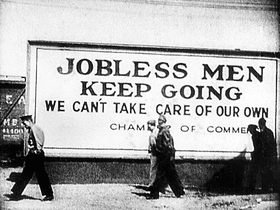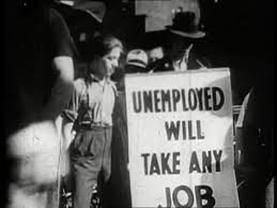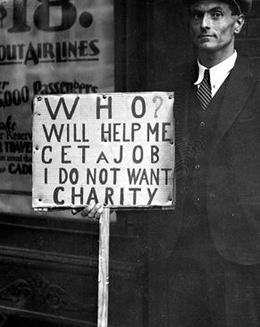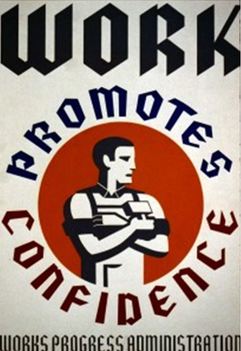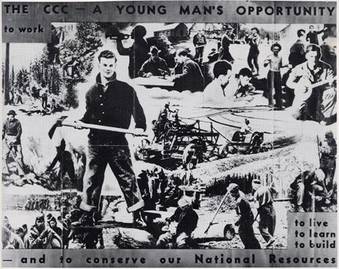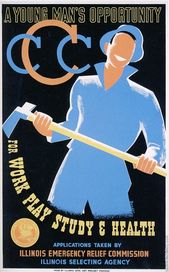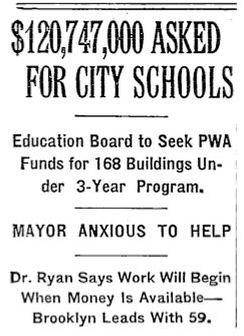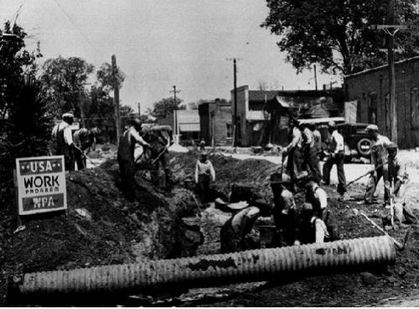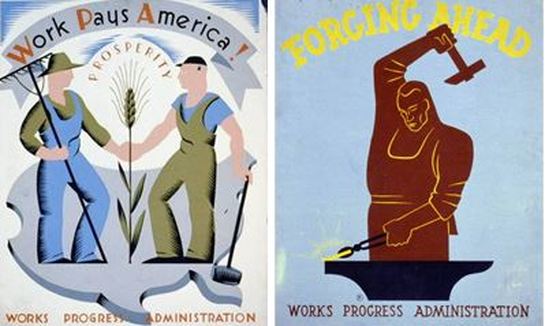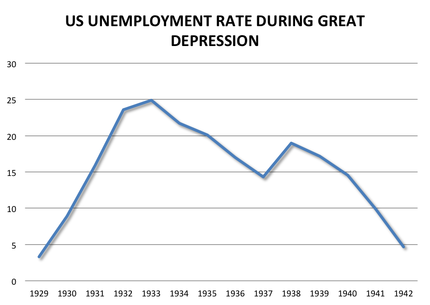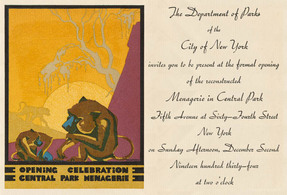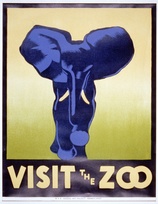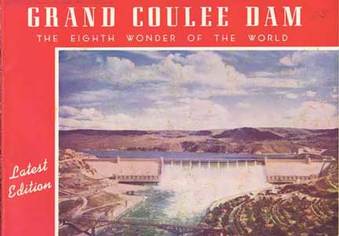Historical Context

Roosevelt displayed effective leadership by steadfastly pushing to replace short-term monetary relief, like government handouts, with long-term solutions, like creating jobs. His empathetic vision for America included mending both the economy and the spirit of the people.
"Continued dependence on relief induces a spiritual and mental disintegration fundamentally destructive to the national fiber. To dole out relief in this way is to administer a narcotic, a subtle destroyer of the human spirit . . . Work must be found for the able-bodied but destitute workers." "Give a man a dole, and you save his body and destroy his spirit. Give him a job and you save both body and spirit." |
Recovery: New Deal Agencies

Roosevelt created dozens of agencies that employed millions of Americans during the Depression. If certain programs proved ineffective, he had the confidence and courage to abandon them and implement improved ones.
The three most prominent agencies were:
The three most prominent agencies were:
Civilian Conservation Corps (CCC)
|
"[The CCC was] a program enacted by Congress to bring relief to young men between 18 and 25 years of age . . . run in a semi-military style and enrolled jobless young men in work camps across the country for about $30 per month. About 2 million young men took part in this program during the 1930s."
-John Hardman, The Carter Center |
"My father and other tenant farmers were hired [by the CCC] to repair a bridge. Although we were very poor, we had the feeling that our government cared and was doing something about poverty and unemployment."
-Anonymous reader, commenting on his/her experience, November 21, 2011, The Nation magazine
|
Public Works Administration (PWA)
"[The PWA] constructed public works as a means of providing employment, stabilizing purchasing power, improving public welfare, and contributing to a revival of American industry.'"
-George Washington University "PWA had an unreasonably huge budget, $3.3 billion . . . Soon after the President had second thoughts . . . and tightened the money. These sudden moves helped cause the infamous Depression Within a Depression, a sharp downturn in 1937 and 1938.'"
-Amity Shales, TIME Magazine |
Works Progress Administration (WPA)
"In addition to the CCC and PWA, there was something called the Works Progress Administration. And that was where my brother took part when he went to Utah because jobs were just hard to find.'"
-Personal Interview with Emil Feccko, senior citizen at Redmond Senior Center who lived through the Great Depression and Roosevelt administration
-Personal Interview with Emil Feccko, senior citizen at Redmond Senior Center who lived through the Great Depression and Roosevelt administration
"Of all of Roosevelt’s New Deal programs, the Works Progress Administration is the most famous, because it affected so many people’s lives. Roosevelt’s vision of a work-relief program employed more than 8.5 million people. For an average salary of $41.57 a month, WPA employees built bridges, roads, public buildings, public parks and airports . . . and 2,566 murals and 17,744 pieces of sculpture that decorate public buildings nationwide . . . it went a long way toward bolstering the self-esteem of workers."
-PBS film The Dust Bowl
-PBS film The Dust Bowl
Legacy
"Oh yes, the Great Depression got better. It was a slow process, but you know he started a lot of things, like WPA and things like that, that put people back to work and saved us. He did a lot of good, I think. He really understood us." |
"Every time I go over to Central Park, I walk into the Children's Zoo. This was built during the Depression by WPA workers. It's an absolutely lovely place. And I cannot help remembering - look, this came out of the Depression . . . because they were given a way to earn money, good things were created." |
|
"The construction of the Grand Coulee Dam on the Columbia River was the crown jewel of President Roosevelt’s public works projects in the Pacific Northwest. Though it was built more than seventy years ago, it is still a massive and productive asset that will have an impact on many generations to come." -Christian McClung, University of Washington |
